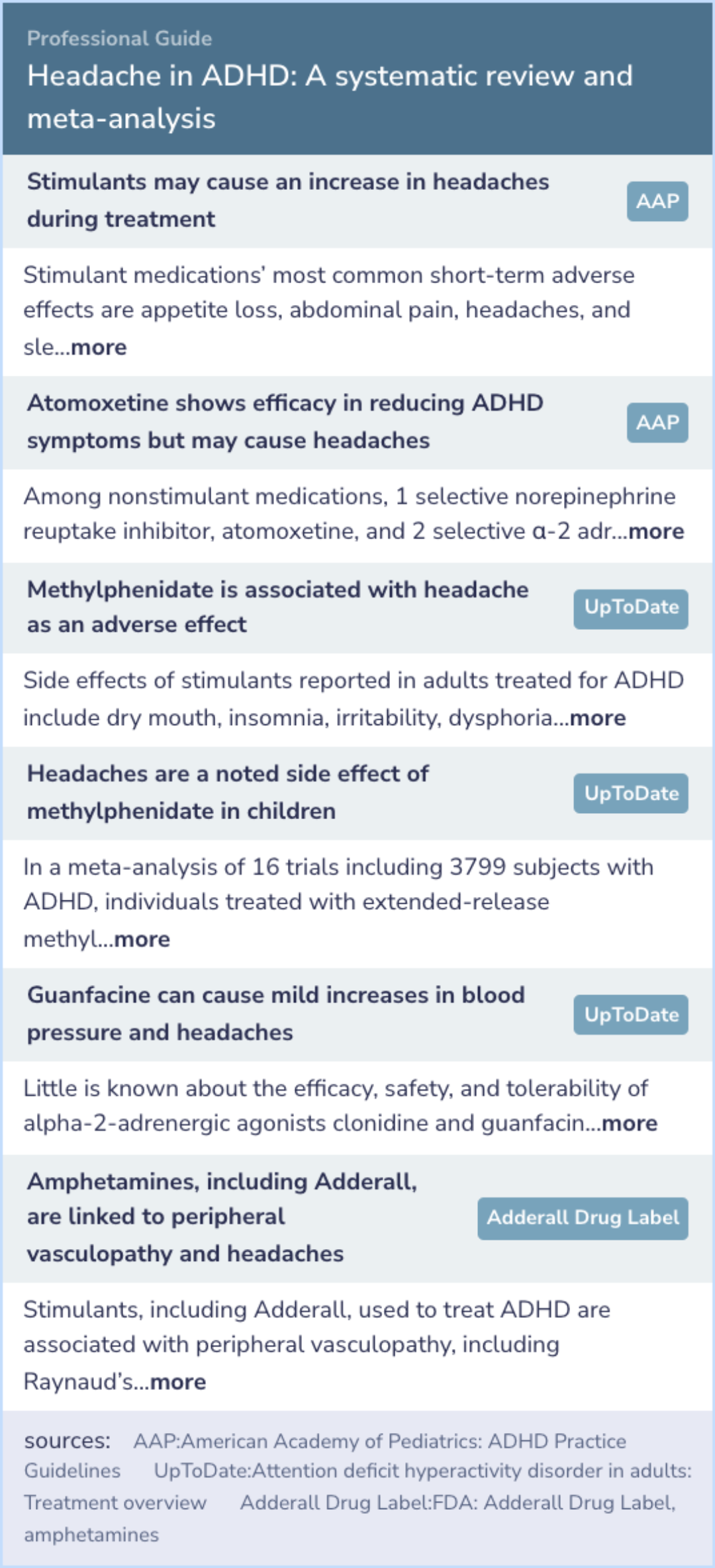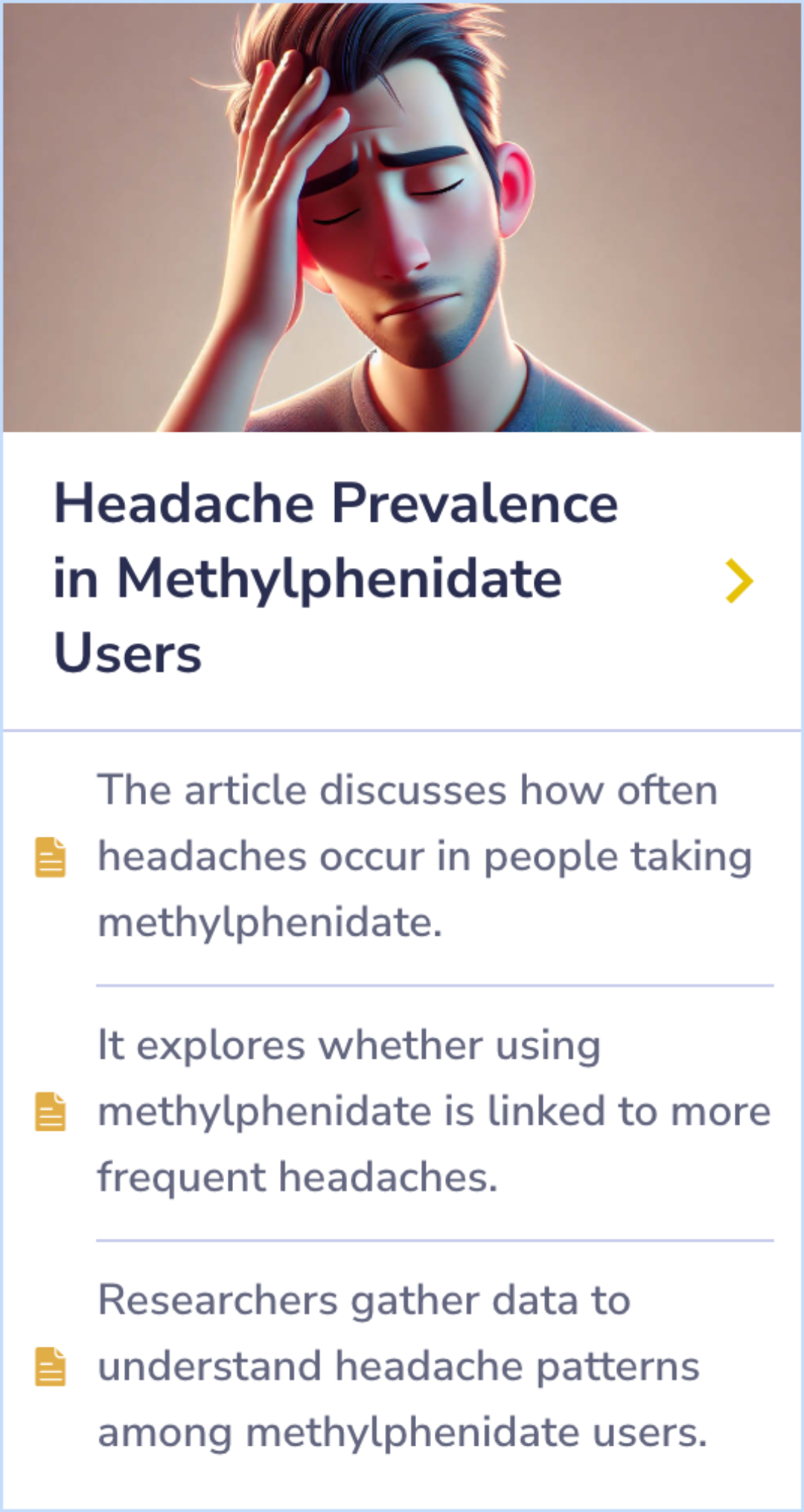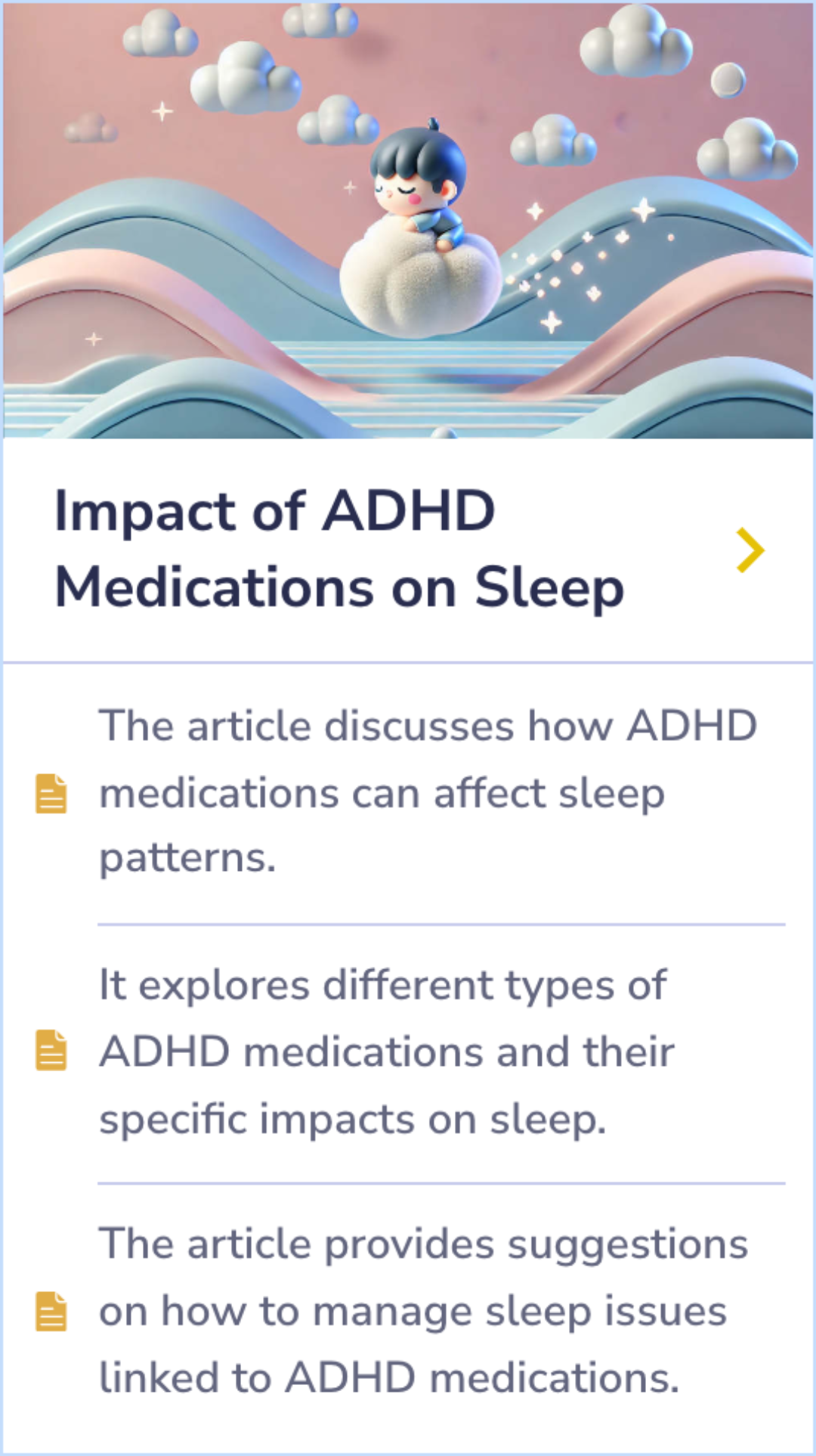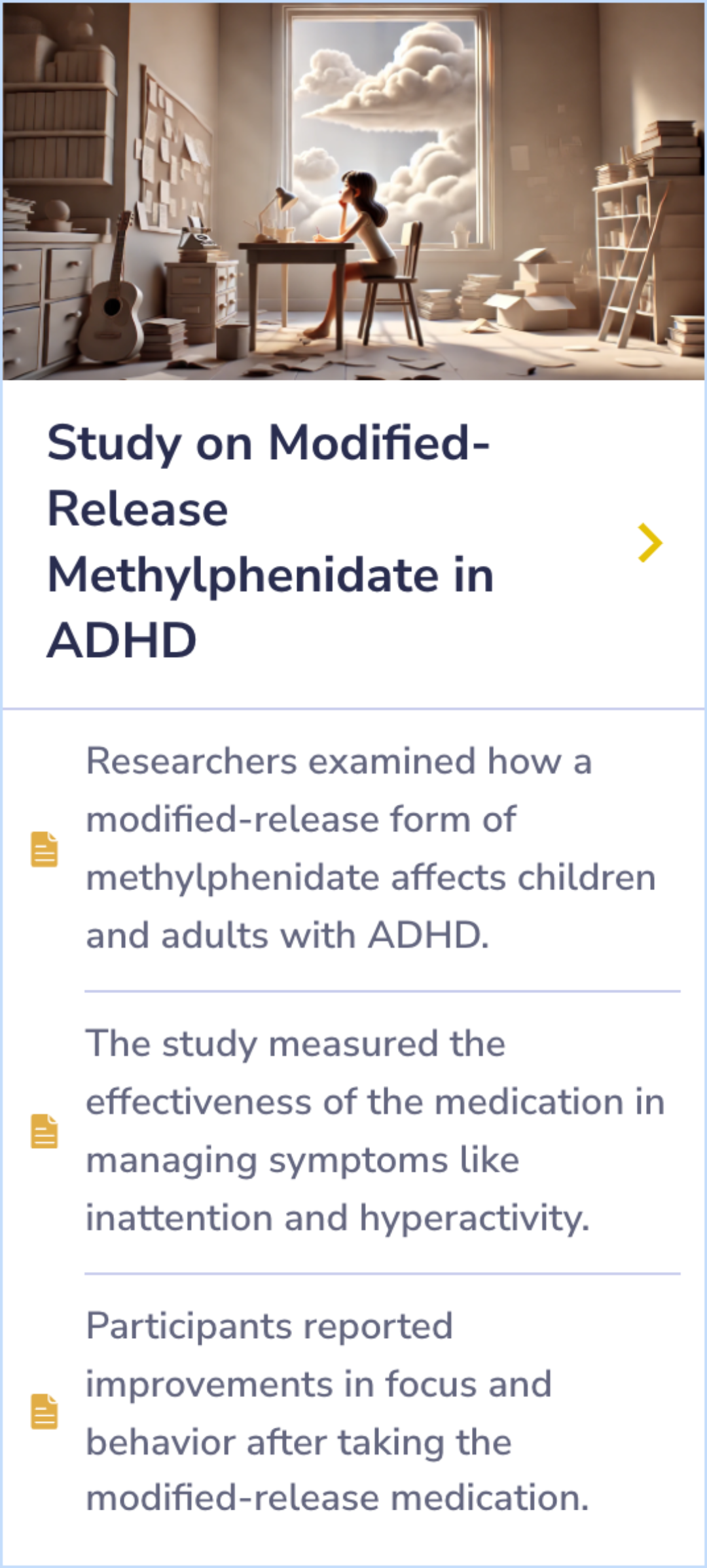Ritalin Paper Database
Visual Abstract
Headache in ADHD as comorbidity and a side effect of medications: a systematic review and meta-analysis
Headache in ADHD: A systematic review and meta-analysis
November 4, 2024
author
Pan PY, Jonsson U, Şahpazoğlu Çakmak SS, Häge A, Hohmann S, Nobel Norrman H, Buitelaar JK, Banaschewski T, Cortese S, Coghill D, Bölte S
journal
Psychol Med
Date Published
2022 Jan
Why link to a visual abstract?
What is a visual abstract?
Original
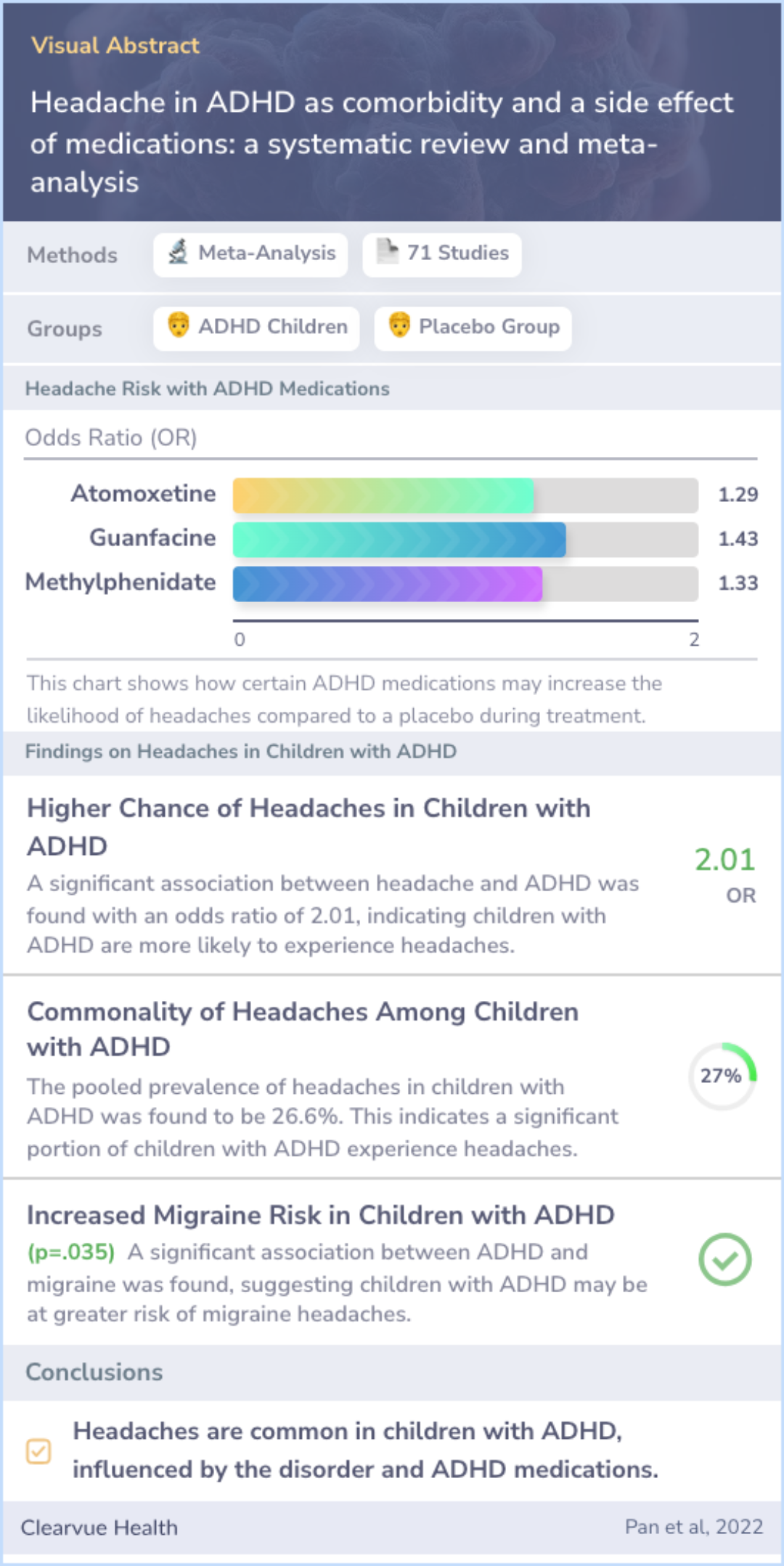
Study Summary
🔬
What They Studied
The study examined the relationship between headaches and ADHD, and how ADHD medications affect headache occurrences.
💡
What They Found
The study found a significant link between headaches and ADHD, revealing that certain ADHD medications, including atomoxetine (Strattera), guanfacine (Intuniv), and methylphenidate (Ritalin), can increase headache occurrences compared to a placebo.
📚
What This Means
The findings show a common occurrence of headaches in children with ADHD and suggest that they can also be a side effect of certain ADHD medications like atomoxetine, guanfacine, and methylphenidate.
Study Summary
Study Overview
This study investigates how headaches relate to ADHD and its medications. It looks at headaches not just as a standalone issue, but also as a common side effect of ADHD treatments. The findings show that headaches significantly impact children's quality of life and treatment success, urging healthcare professionals to assess headache presence in ADHD management.
By understanding the link between ADHD and headaches, the study lays the foundation for better medical guidance and treatment strategies.
By understanding the link between ADHD and headaches, the study lays the foundation for better medical guidance and treatment strategies.
Abstract: background
There is mixed evidence on the association between headache and attention-deficit/hyperactivity disorder (ADHD), as well as headache and ADHD medications. This systematic review and meta-analysis investigated the co-occurrence of headache in children...more

Headaches and ADHD
"Headache is not only a common symptom in children with ADHD, but also a frequent side effect of many pharmacological treatments for ADHD, which may complicate clinical management and affect treatment adherence."
Monitoring Headaches
"Our findings suggest that headache is among the most common adverse effects of ADHD medications, emphasizing the need for clinicians to monitor and manage this symptom carefully in pediatric patients."
Association of Headaches
"The presence of headache as a side effect of certain ADHD medications indicates that it may play a role in the broader tolerability profile of these treatments, impacting patient compliance and long-term outcomes."
Study Summary
Methods
Researchers explored multiple databases, investigating studies until January 2021. They compared headache prevalence in children with ADHD to those without.
Additionally, they reviewed trials up to June 2020 regarding medications like atomoxetine (Strattera), guanfacine, and methylphenidate (Ritalin). Placebo-controlled studies reporting headache as a side effect were included, analyzing data from 13 epidemiological studies and 58 clinical trials.
Additionally, they reviewed trials up to June 2020 regarding medications like atomoxetine (Strattera), guanfacine, and methylphenidate (Ritalin). Placebo-controlled studies reporting headache as a side effect were included, analyzing data from 13 epidemiological studies and 58 clinical trials.
Abstract: methods
Embase, Medline and PsycInfo were searched for population-based and clinical studies comparing the prevalence of headache in ADHD and controls through January 26, 2021. In addition, we updated the search of a previous systematic review and network me...more

Study Summary
Results
The research highlighted a clear link between headaches and ADHD. Kids with ADHD were twice as likely to experience headaches than those without.
Among treatments, atomoxetine (Strattera), guanfacine, and methylphenidate (Ritalin) showed a higher chance of causing headaches compared to placebos, suggesting that some ADHD drugs can intensify headaches in children.
Among treatments, atomoxetine (Strattera), guanfacine, and methylphenidate (Ritalin) showed a higher chance of causing headaches compared to placebos, suggesting that some ADHD drugs can intensify headaches in children.
Abstract: results
In epidemiological studies, a significant association between headache and ADHD was found [odds ratio (OR) = 2.01, 95% confidence interval (CI) = 1.63–2.46], which remained significant when limited to studies reporting ORs adjusted for possible confo...more
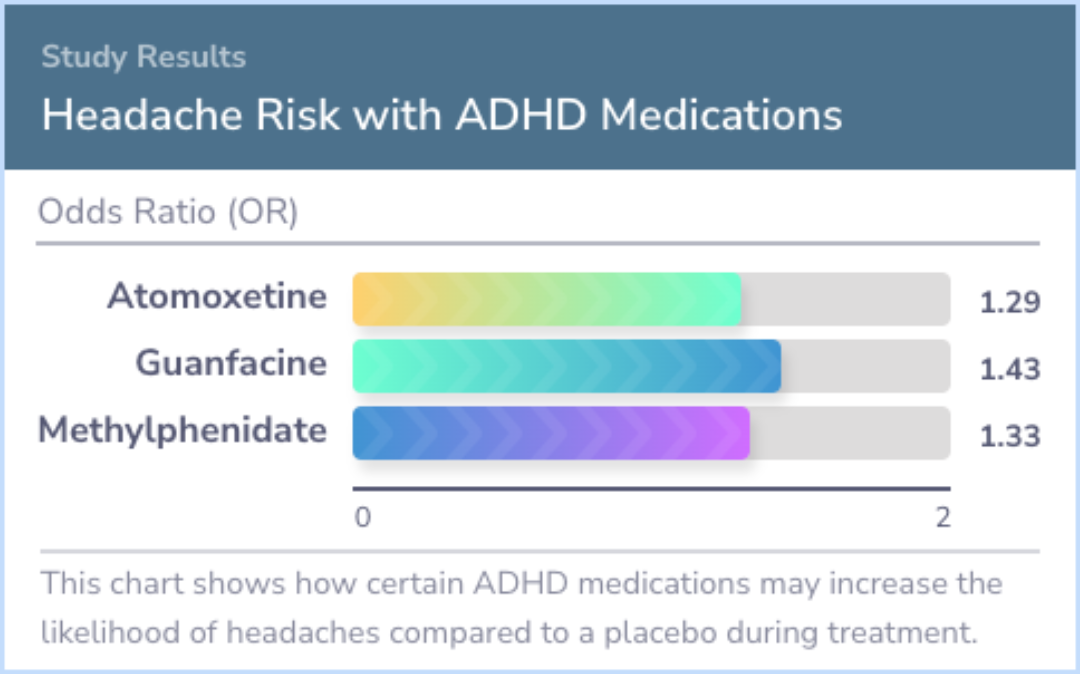
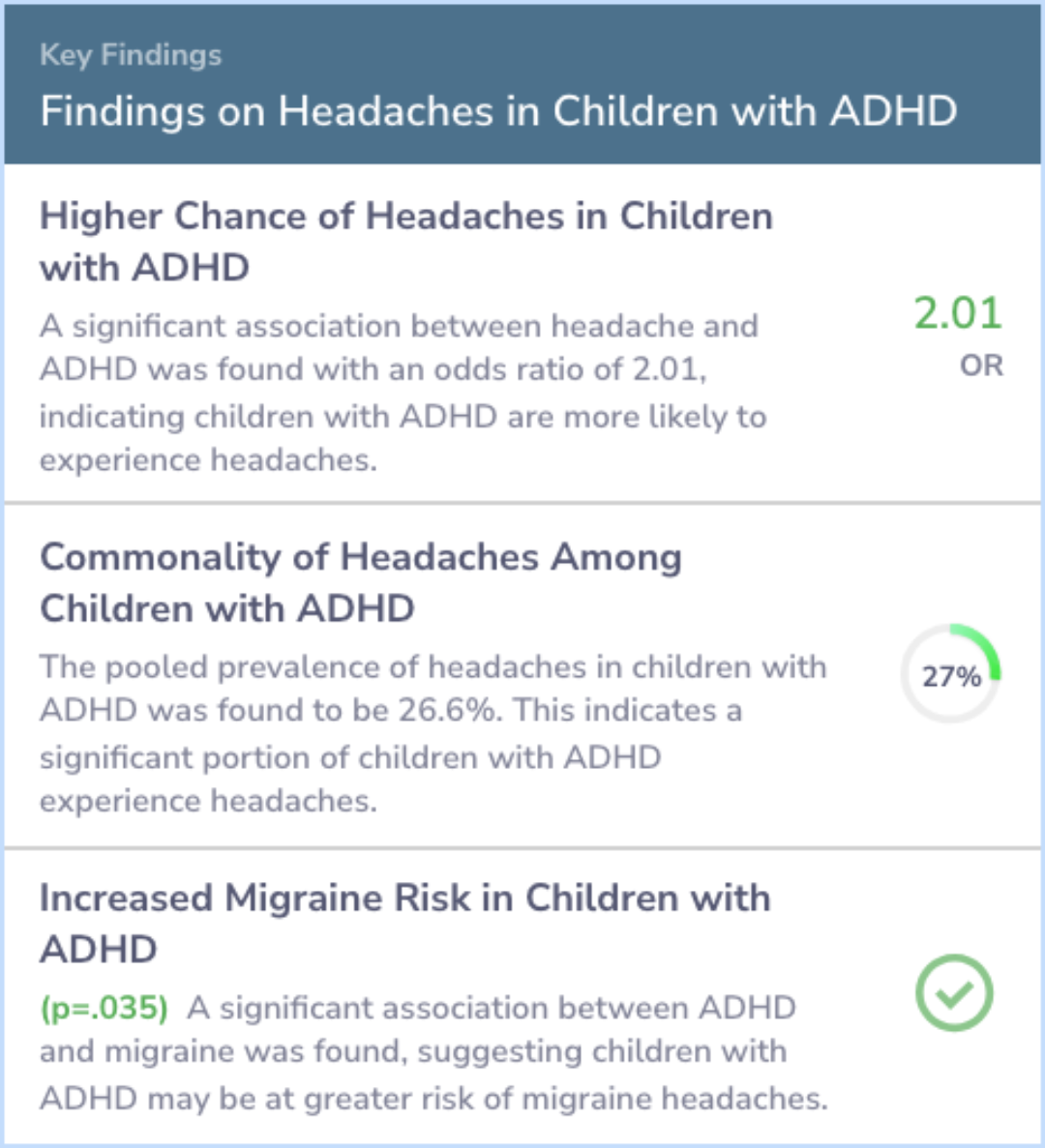
Study Summary
Conclusions
The findings indicate that headaches are prevalent in children with ADHD, both naturally and as a medication side effect.
It's advised that healthcare professionals carefully monitor and manage headaches in ADHD patients, especially when medications like guanfacine, atomoxetine, or methylphenidate are involved.
It's advised that healthcare professionals carefully monitor and manage headaches in ADHD patients, especially when medications like guanfacine, atomoxetine, or methylphenidate are involved.
Abstract: conclusions
The summarized evidence suggests that headache is common in children with ADHD, both as part of the clinical presentation as such and as a side effect of some standard medications. Monitoring and clinical management strategies of headache in ADHD, in...more
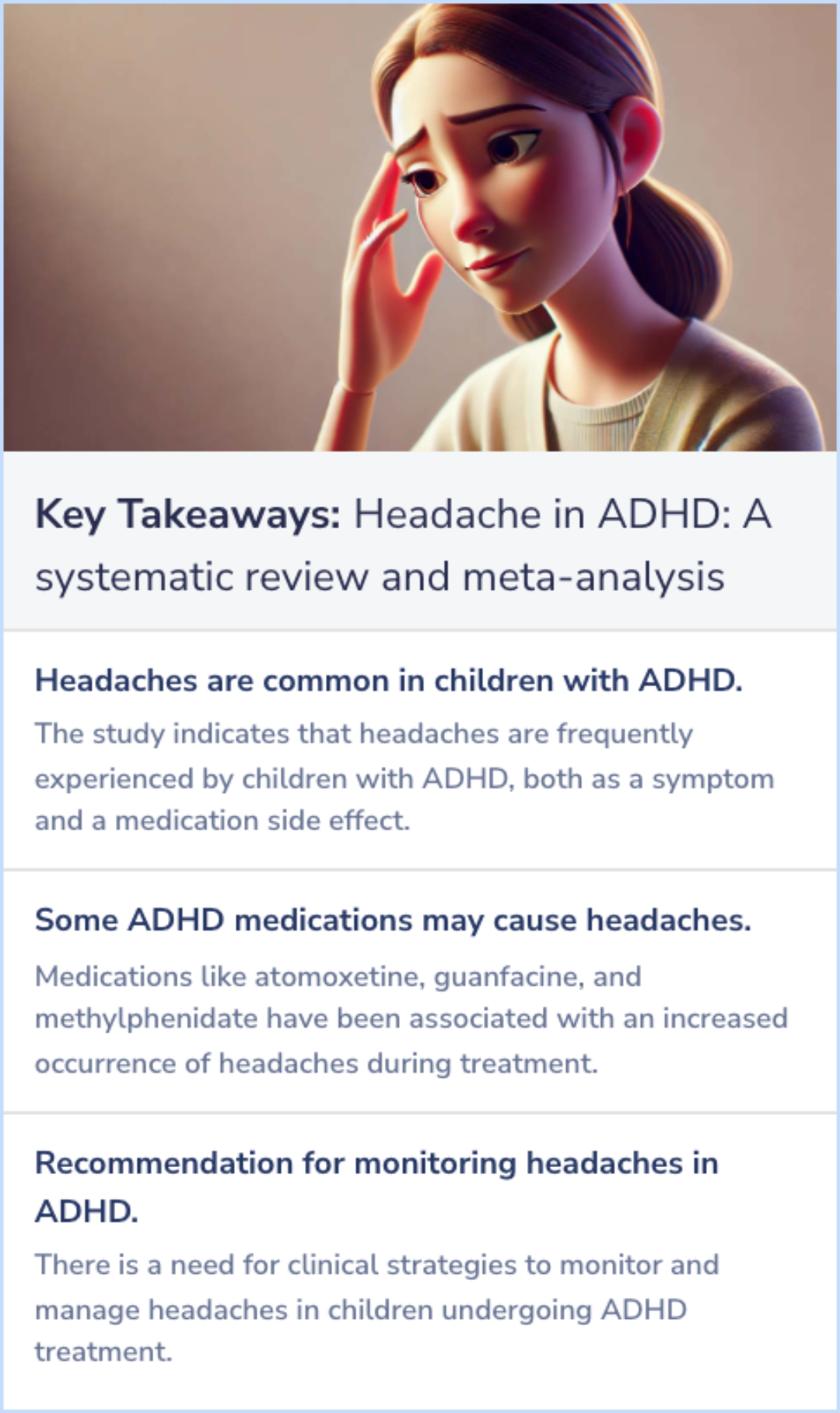
Background Information
Patient Guide
👨⚕️
Methylphenidate and ADHD
Used primarily for ADHD; approved for children over six, alters dopamine levels.
📉
ADHD Medication Side Effects
Adderall can cause growth suppression, cardiovascular effects, and rarely serotonin syndrome.
💊
Amphetamines in ADHD Management
Include Adderall; part of a comprehensive ADHD plan to aid attention and reduce impulsivity.
🩺
Medication Monitoring
Focus on monitoring cardiac health, growth in children, and potential misuse with ADHD meds.
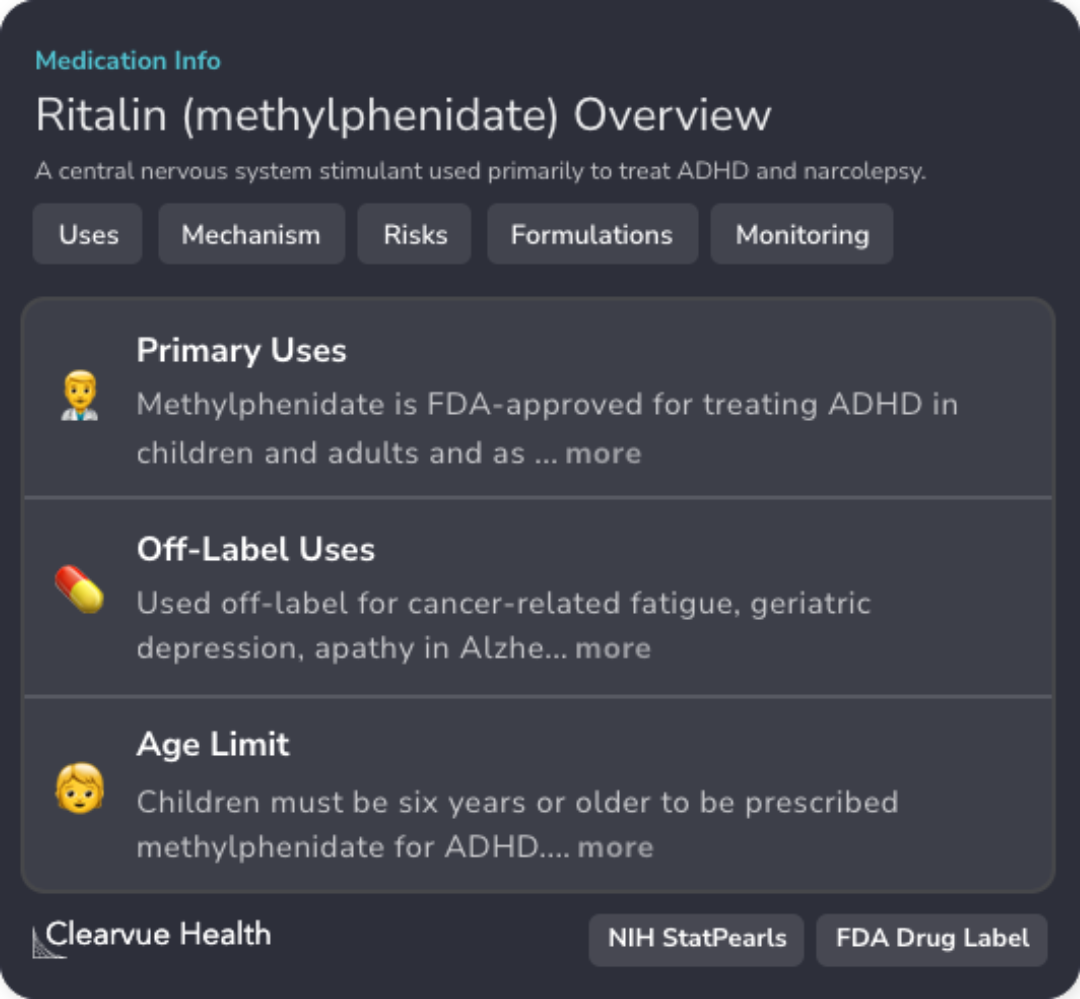
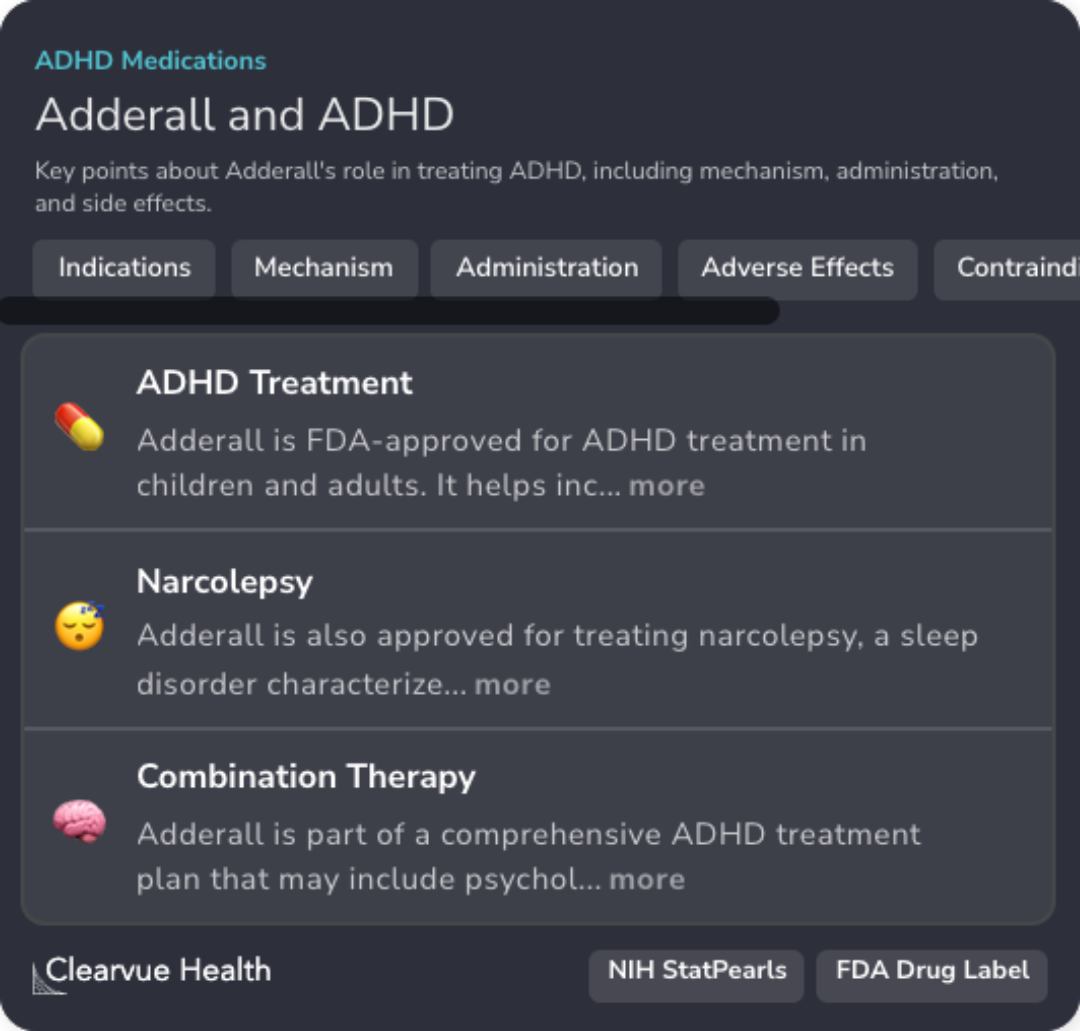
Professional Guide
Expert Opinion: Headache in ADHD: A systematic review and meta-analysis
Consistent with the increased prevalence of headaches in children with ADHD, the association with stimulant medications is particularly pertinent.
Stimulants frequently cause headaches, sleep disruption, and appetite changes.
Atomoxetine, a nonstimulant option, remains effective yet also may induce headaches.
Methylphenidate, while improving ADHD symptoms and quality of life, contributes to headache as a notable side effect.
Stimulants frequently cause headaches, sleep disruption, and appetite changes.
Atomoxetine, a nonstimulant option, remains effective yet also may induce headaches.
Methylphenidate, while improving ADHD symptoms and quality of life, contributes to headache as a notable side effect.
Evidence Summary
Examining Headache Frequency with Methylphenidate Use
Methylphenidate use is linked to a closer look at headache occurrences, focusing on how frequently users report this side effect. Researchers aim to see if there's a trend between taking methylphenidate and experiencing more headaches.
Data collected from individuals taking the medication helps build a clearer picture of these patterns, offering insight into headache frequency and its potential connection to methylphenidate use.
Data collected from individuals taking the medication helps build a clearer picture of these patterns, offering insight into headache frequency and its potential connection to methylphenidate use.
Evidence Summary
Managing Sleep Disturbances from ADHD Medications
ADHD medications can have various impacts on sleep, often disrupting regular sleep patterns. Different medications may cause distinct effects, influencing how quickly someone falls asleep or their overall sleep quality.
To manage these issues, the article suggests practical steps like adjusting medication timing or establishing a bedtime routine, offering helpful insights for minimizing sleep disturbances linked to treatment.
Understanding each medication’s unique influence can help in making more informed choices.
To manage these issues, the article suggests practical steps like adjusting medication timing or establishing a bedtime routine, offering helpful insights for minimizing sleep disturbances linked to treatment.
Understanding each medication’s unique influence can help in making more informed choices.
Evidence Summary
Enhanced Focus and Behavior with Modified-Release Methylphenidate
Modified-release methylphenidate demonstrates significant improvements in attention and behavior for both children and adults facing ADHD challenges. Participants in the study reported enhanced focus and better control over hyperactivity after using this medication. By evaluating the impact of this specific formulation, researchers aim to provide insight into how effectively it can alleviate symptoms associated with ADHD across different age groups.
The results highlight the medication's role in addressing critical aspects of ADHD, indicating that it may provide a reliable option for managing symptoms and enhancing daily functioning.
The results highlight the medication's role in addressing critical aspects of ADHD, indicating that it may provide a reliable option for managing symptoms and enhancing daily functioning.
